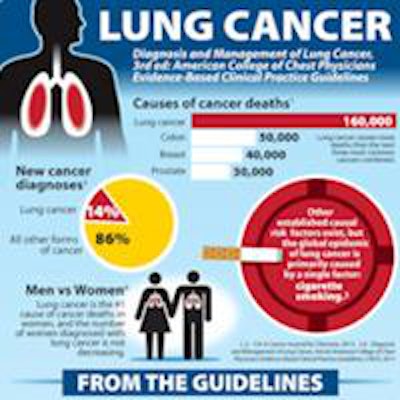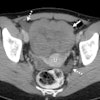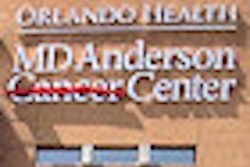
The American College of Chest Physicians (ACCP) today recommended lung cancer screening with low-dose CT for patients at high risk of the disease. But the new guidelines closely follow more conservative recommendations for screening.
The recommendations, published in Chest, cite evidence from the National Lung Screening Trial and other studies showing that a structured lung cancer screening protocol can reduce the risk of the disease for individuals at high risk (Chest, May 7, 2013).

The guidelines hew closely to conservative recommendations published last year, which recommend low-dose CT screening only for individuals ages 55 to 75 with a smoking history of 30 or more pack-years who are either still smoking or have quit within the past 15 years.
Annual low-dose CT is recommended (Grade 2B) for these individuals, "but only in settings that can deliver the comprehensive care provided to National Lung Screening Trial participants," the authors added.
Screening is not recommended (Grade 2C) for individuals with a smoking history of fewer than 30 pack-years, those who fall outside the age guidelines, or those with comorbidities that might limit their life expectancy.
The restrictions on who should be included in CT screening programs are likely to disappoint screening advocates who are pushing for inclusion of more individuals -- such as patients with chronic obstructive pulmonary disease (COPD) and otherwise-healthy 75-year-olds -- who are also at high risk of the disease.
The guidelines also call for smoking cessations programs, and the establishment of a registry designed to help address many remaining unanswered questions and to clarify misconceptions that surround lung cancer screening among patients and physicians. Finally, the guidelines call for the establishment of quality metrics so that benefits are optimized and harm is kept low.
"Our new lung cancer guidelines take into account the many advances and new information in the field by providing comprehensive and nuanced recommendations related to prevention, screening, diagnosis, staging, and medical and surgical treatments," said Dr. Michael Alberts from Moffitt Cancer Center in Tampa, FL, in a statement.
The recommendations also highlight the importance of multidisciplinary, team-based care in lung cancer treatment. Screening decisions are collaborative and based on collective knowledge to provide the best care, added Alberts, who served as guideline chair.
"Lung cancer screening offers a potential benefit for select individuals but it is not a substitute for stopping smoking," stated Dr. Frank Detterbeck from Yale University, who served as vice chair of the guidelines panel.




















